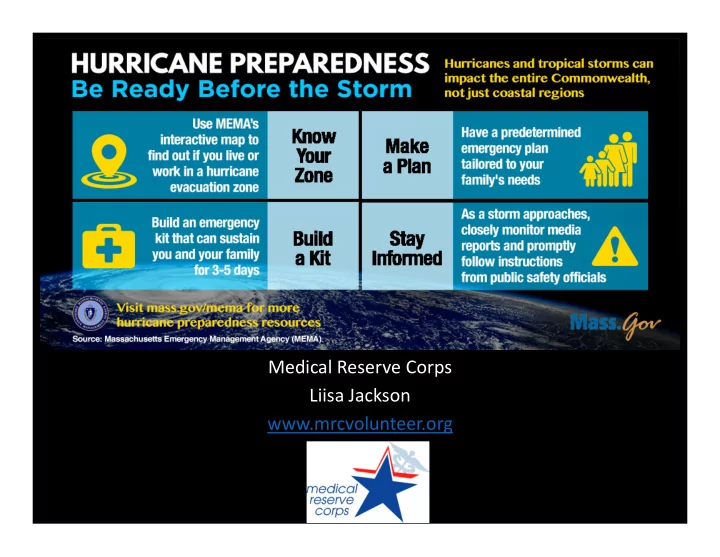

Medical Reserve Corps Liisa Jackson www.mrcvolunteer.org
Hurricane Preparedness Hurricane Preparedness Hurricane Preparedness Hurricane Preparedness • What are the Hurricane Hazards? • What does it mean to you? • What actions should you take to be prepared?
Hurricane Hazards Come in Many Hurricane Hazards Come in Many Hurricane Hazards Come in Many Hurricane Hazards Come in Many Forms Forms Forms Forms • Storm surge • High winds • Tornadoes • Flooding
Storm Surge Storm Surge Storm Surge Storm Surge • Storm surge is simply water that is pushed toward the shore by the force of the winds swirling around the storm.
High Winds High Winds High Winds High Winds • The intensity of a land falling hurricane is expressed in terms of categories that relate wind speeds and potential damage.
High Winds High Winds High Winds High Winds (Cont) (Cont) (Cont) (Cont) • The strongest winds usually occur in the right side of the eye wall of the hurricane. • Wind speed usually decreases significantly within 12 hours after landfall.
Tornadoes Tornadoes Tornadoes Tornadoes • Hurricanes can also produce tornadoes that add to the storm's destructive power. Tornadoes are most likely to occur in the right-front quadrant of the hurricane.
Flooding Flooding Flooding Flooding • While storm surge is always a potential threat, more people have died from inland flooding from 1970 up to 2000. Intense rainfall is not directly related to the wind speed of tropical cyclones.
Have a Plan Have a Plan Have a Plan Have a Plan • Look carefully at the safety actions associated with each type of hurricane hazard and prepare your family disaster plan accordingly. • But remember this is only a guide. The first and most important thing anyone should do when facing a hurricane threat is to use common sense.
Plan Plan Plan Plan • Locate a safe room or the safest areas in your home for each hurricane hazard. In certain circumstances the safest areas may not be your home but within your community. • Determine escape routes from your home and places to meet. These should be measured in tens of miles rather than hundreds of miles.
• Have an out-of-state friend as a family contact, so all your family members have a single point of contact. • Make a plan now for what to do with your pets if you need to evacuate. • Post emergency telephone numbers by your phones and make sure your children know how and when to call 911.
• Check your insurance coverage - flood damage is not usually covered by homeowners insurance. • Use a NOAA weather radio. Remember to replace its battery every 6 months, as you do with your smoke detectors. • Take First Aid, CPR and disaster preparedness classes.
Emergency Supplies • Water - at least 1 gallon daily per person for 3 to 7 days • Food - at least enough for 3 to 7 days — non-perishable packaged or canned food / juices
Emergency Supplies — foods for infants or the elderly — snack foods — non-electric can opener — cooking tools / fuel — paper plates / plastic utensils • Blankets / Pillows, etc.
Emergency Supplies • Clothing - seasonal / rain gear/ sturdy shoes • First Aid Kit / Medicines / Prescription Drugs • Special Items - for babies and the elderly • Toiletries / Hygiene items / Moisture wipes • Flashlight / Batteries
Emergency Supplies • Radio - Battery operated and NOAA weather radio • Telephones - Fully charged cell phone with extra battery and a traditional (not cordless) telephone set
Emergency Supplies • Cash (with some small bills) and Credit Cards - Banks and ATMs may not be available for extended periods • Keys
Emergency Supplies • Toys, Books and Games • Important documents - in a waterproof container or watertight resealable plastic bag insurance, medical records, bank account numbers, Social Security card, etc. • Tools - keep a set with you during the storm • Vehicle fuel tanks filled
Emergency Supplies • Pet care items • proper identification / immunization records / medications • ample supply of food and water • a carrier or cage muzzle and leash
Scenario It is hurricane season and you want to prepare yourself, your family and your pets in case there is a hurricane: What steps do you take? Who is involved? What do you want to have in place?
Scenario There is a hurricane watch: What steps do you take? Who is involved? What do you want to have in place ?
Scenario There is a hurricane warning: What steps do you take? Who is involved? What do you want to have in place?
Scenario There is a hurricane evacuation order: What steps do you take? Who is involved? What do you want to have in place?
Home work
Questions?
Have a Plan Which Have a Plan Which Have a Plan Which Have a Plan Which Everyone Understands Everyone Understands Everyone Understands Everyone Understands This is the most important step. Liisa Jackson MRC Coordinator www.mrcvolunteer.org
Recommend
More recommend